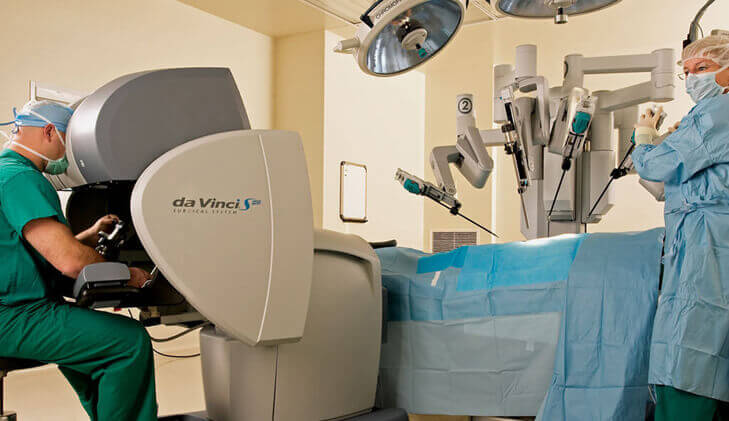
What is Robotic Surgery
What is robotic surgery and what is its main function at The Urology Hospital, Pretoria, currently?
Robotic surgery is the relatively new high tech surgery which has been available in rest of the world in many countries for nearly twelve years but was introduced to South Africa roughly two years ago at the The Urology Hospital, Pretoria. This surgery provides high precision surgery which has a much better chance of preserving quality of life issues such as urinary continence and potency without compromising cure of prostate cancer, and in many series actually improves the cure rate by reducing the positive cancer margins due to the improved vision. At the Urology Hospital currently the robotic surgery is employed mainly for radical prostate surgery but is soon to be employed in partial nephrectomies for kidney cancer and bladder removal for bladder cancer.
What did you do before robotic surgery and how different is this new technology?
Prior to Robotic surgery the patients underwent open surgery either abdominally or trans-perineally. Both of these options have pros and cons but left the patients with large wounds which put them out of action for 4 – 6 weeks and was accompanied with significantly increased blood loss, lengthy hospital stays of up to a week, increased chances of urinary incontinence up to 20 % in some series and impotence rates of up to 30 – 40 %. The new Robotic surgery has reduced all of these aspects for the patients now on average losing between 50 and 100 ml of blood intra-operatively. Hospital stay has been reduced to 36 – 48 hours with reduced catheterization rates of five to six days instead of two to two and a
half weeks and return of the patients to work within 10 – 14 days versus nearly 6 weeks with the open surgeries.
What impact is robotic surgery having on prostate surgery?
This surgery has impacted significantly on prostatic surgery around the world. In the United States today over 90 % of prostate cancer surgery is performed robotically and in Australia more than 70 %. This is because of the abovementioned improved outcomes.
Please explain how the removal of a cancerous prostate affects a man’s potency and how robotic surgery is impacting on this?
The nerves and blood vessels which run in very close proximity to the prostate and end up in the erectile tissue are often damaged inadvertently by removal of the prostate because the blood vessels are frequently not visualized whereas with the robotic surgery the neurovascular bundles can be identified and separated from the prostate with preservation of erectile function as a result.
Please explain how robotic surgery works: does the robot do all the work or does the surgeon and his team still have a big role to play?
One of the misconceptions of robotic surgery is precisely that the robot does all the work. This is far from the truth and in actual fact the robot is only an instrument in the hands of an experienced surgeon who with proper training and guidance can use this technology and the advantages it offers to carry out prostate surgery with far greater precision than prior to the technology being launched.
How successful has robotic surgery been at The Urology Hospital and what is the feedback from patients?
The surgery at The Urology Hospital has been extremely successful with minimal side effects and very positive feedback from the patients. In actual fact the main drivers of the surgery have been patient recommendations. There has been a range of outcomes data in terms of some patients getting back to work within a week or two versus four to six weeks in previous open surgery. Hospital stay has been reasonably constant at 36 – 48 hours; blood loss has been minimal with only a
handful of patients having to receive any blood transfusion. Continence rates being in excess of 95% with potency rates in patients where potency sparing procedures were done have been significantly higher with previous open surgery.
What is the future of robotic surgery at The Urology Hospital? Will all major surgery go this route or is robotic surgery confined to prostate surgery only?
Robotic surgery is not confined to prostate surgery and we are in fact starting to do kidney cancer surgery and bladder cancer surgery robotically. The long term idea is to initiate a multi-disciplinary centre where colo-rectal surgery and even gynecological surgery can be performed robotically as has been done in many centres in the Western world. The future of this surgery is bright if the trends that have been set in the rest of the world continue in South Africa and there is no reason to believe that they will not be, this surgery will gain popularity driven by decrease in costs and improved patient outcomes.
